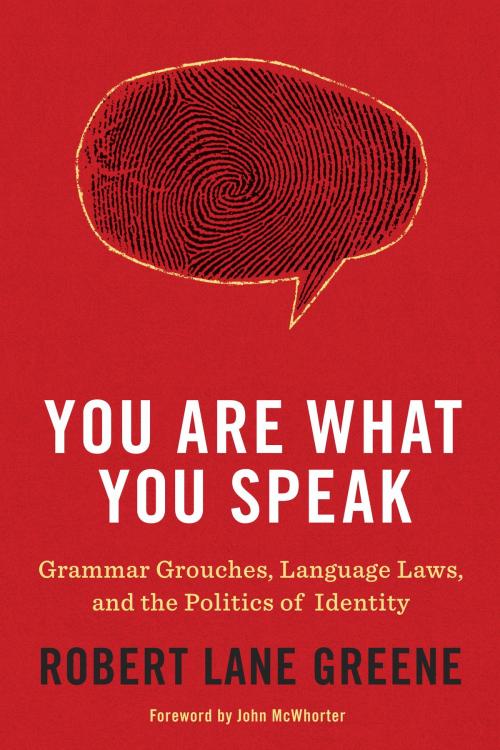You Are What You Speak
Grammar Grouches, Language Laws, and the Politics of Identity
Nonfiction, Reference & Language, Language Arts, Linguistics, Social & Cultural Studies, Social Science, Anthropology, History| Author: | Robert Lane Greene | ISBN: | 9780440339762 |
| Publisher: | Random House Publishing Group | Publication: | March 8, 2011 |
| Imprint: | Delacorte Press | Language: | English |
| Author: | Robert Lane Greene |
| ISBN: | 9780440339762 |
| Publisher: | Random House Publishing Group |
| Publication: | March 8, 2011 |
| Imprint: | Delacorte Press |
| Language: | English |
"An insightful, accessible examination of the way in which day-to-day speech is tangled in a complicated web of history, politics, race, economics and power." - Kirkus
What is it about other people’s language that moves some of us to anxiety or even rage? For centuries, sticklers the world over have donned the cloak of authority to control the way people use words. Now this sensational new book strikes back to defend the fascinating, real-life diversity of this most basic human faculty.
With the erudite yet accessible style that marks his work as a journalist, Robert Lane Greene takes readers on a rollicking tour around the world, illustrating with vivid anecdotes the role language beliefs play in shaping our identities, for good and ill. Beginning with literal myths, from the Tower of Babel to the bloody origins of the word “shibboleth,” Greene shows how language “experts” went from myth-making to rule-making and from building cohesive communities to building modern nations. From the notion of one language’s superiority to the common perception that phrases like “It’s me” are “bad English,” linguistic beliefs too often define “us” and distance “them,” supporting class, ethnic, or national prejudices. In short: What we hear about language is often really about the politics of identity.
Governments foolishly try to police language development (the French Academy), nationalism leads to the violent suppression of minority languages (Kurdish and Basque), and even Americans fear that the most successful language in world history (English) may be threatened by increased immigration. These false language beliefs are often tied to harmful political ends and can lead to the violation of basic human rights. Conversely, political involvement in language can sometimes prove beneficial, as with the Zionist revival of Hebrew or our present-day efforts to provide education in foreign languages essential to business, diplomacy, and intelligence. And yes, standardized languages play a crucial role in uniting modern societies.
As this fascinating book shows, everything we’ve been taught to think about language may not be wrong—but it is often about something more than language alone. You Are What You Speak will certainly get people talking.
"An insightful, accessible examination of the way in which day-to-day speech is tangled in a complicated web of history, politics, race, economics and power." - Kirkus
What is it about other people’s language that moves some of us to anxiety or even rage? For centuries, sticklers the world over have donned the cloak of authority to control the way people use words. Now this sensational new book strikes back to defend the fascinating, real-life diversity of this most basic human faculty.
With the erudite yet accessible style that marks his work as a journalist, Robert Lane Greene takes readers on a rollicking tour around the world, illustrating with vivid anecdotes the role language beliefs play in shaping our identities, for good and ill. Beginning with literal myths, from the Tower of Babel to the bloody origins of the word “shibboleth,” Greene shows how language “experts” went from myth-making to rule-making and from building cohesive communities to building modern nations. From the notion of one language’s superiority to the common perception that phrases like “It’s me” are “bad English,” linguistic beliefs too often define “us” and distance “them,” supporting class, ethnic, or national prejudices. In short: What we hear about language is often really about the politics of identity.
Governments foolishly try to police language development (the French Academy), nationalism leads to the violent suppression of minority languages (Kurdish and Basque), and even Americans fear that the most successful language in world history (English) may be threatened by increased immigration. These false language beliefs are often tied to harmful political ends and can lead to the violation of basic human rights. Conversely, political involvement in language can sometimes prove beneficial, as with the Zionist revival of Hebrew or our present-day efforts to provide education in foreign languages essential to business, diplomacy, and intelligence. And yes, standardized languages play a crucial role in uniting modern societies.
As this fascinating book shows, everything we’ve been taught to think about language may not be wrong—but it is often about something more than language alone. You Are What You Speak will certainly get people talking.















